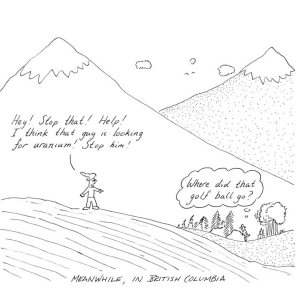Despite a broadly declining market, the week ended April 26, the 17th trading week of 2008, proved to be a mergers-and-acquisitions extravaganza in the junior mining sector.
• In the biggest of the small deals, First Quantum Minerals made its first significant move away from Africa and copper with a surprise $281-million offer to buy Peter Walker’s Scandinavian Minerals and its large, low-grade Kevitsa nickel deposit in central Finland.
• Eldorado Gold tabled a friendly, $148-million bid for Frontier Pacific Mining and its Perama Hill gold project in northeastern Greece. Every Frontier Pacific share would be swapped for 0.122 of an Eldorado share, representing a 28.6% premium.
• In yet more friendliness, Consolidated Thompson Iron Mines unveiled an all-share offer for Quinto Mining and its nearby iron ore assets in the Labrador Trough camp. Quinto shareholders will get one Thompson share for every five held, resulting in Quinto shareholders owning almost 14% of enlarged company.
• The at-times-unloved Yukon Zinc was double whammied with two juicy takeover offers, one from Griffin Mining and the second from a Chinese group, that sent the stock surging in two phases to 21.
• The juniors active in Ecuador started the week with a flurry of press releases expressing concern at the Ecuadorian government’s freeze on all mineral exploration in the country. Share prices were battered across this group, but rebounded about halfway by week’s end owing to an expression by Ecuadorian President Rafael Correa that there was room for “responsible” mining in the country.
That’s a pretty slippery word, given that many leftists across Latin America believe capitalism is fundamentally irresponsible.
We’re pretty gloomy on the prospects for foreign capitalists in Ecuador. Correa has been fearless in purging top levels of the Ecuadorian military after they apparently cooperated with their counterparts in Colombia and the U. S. to facilitate an attack on Colombian narco-guerillas on Ecuadorian soil. Meanwhile the newly installed defense minister, described as a “rumpled poet,” has talked openly about the dangers of “ideological contagion” from the U. S.
With encouragement from Venezuela’s buffoonish Hugo Chavez, Correa is also moving ahead with the closure of the U. S. AWAC base at Manta in coastal Ecuador, which has been helpful in catching drug traffickers.
But for an even better idea of what awaits the mining industry, look no further than the Ecuadorian government’s shoddy treatment of foreign oil investors such as EnCana and Occidental Petroleum, the latter of which had 7% of its global output seized by the government in 2006. Just google “Ecuador” and “oil” and you’ll find a similar pattern of semi-soothing words from Correa that were followed up with his October 2007 decree that effectively said a 50% windfall oil profits tax passed into law in 2006 was not enough. Rather, the state should receive 99% of profits, although the government emphasized at the time that this was not — wink, wink — nationalization.
If Correa’s not afraid to push around Occidental Petroleum, the U. S. Air Force and his own scheming generals, what chance do a few scruffy, nouveau riche geologists have?
On the other hand, in socialist basket cases such as Bolivia and Cuba, companies like Apex Silver Mines, Coeur d’Alene Mines and Sherritt International have shown it is possible to hang on, build and operate mines, and delicately take profits out for the benefit of shareholders.
• The new Socit Gnrale Gold Hedge Book Analysis reveals that the higher gold price has not enticed producers to sell forward their gold to lock in current prices. Their analysis shows that producers’ hedge books stood at 26.86 million oz. at the end of 2007, the lowest level since 1992. For all of 2007, the de-hedging was a record 14.34 million oz., though the value of the combined global book marked-to market deteriorated slightly to negative $9.4 billion.


Be the first to comment on "Junior miners: get ’em while they’re hot"